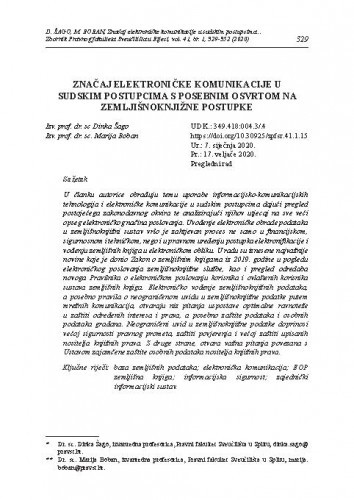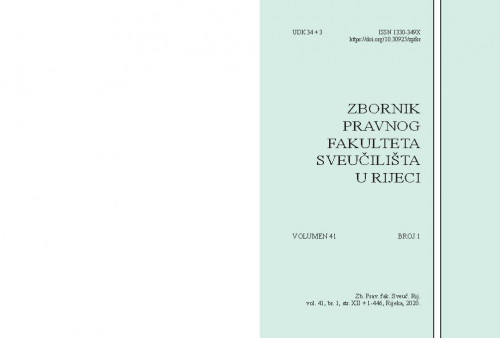U članku autorice obrađuju temu uporabe informacijsko-komunikacijskih tehnologija i elektroničke komunikacije u sudskim postupcima dajući pregled postojećega zakonodavnog okvira te analizirajući njihov utjecaj na sve veći opseg elektroničkog načina poslovanja. Uvođenje elektroničke obrade podataka u zemljišnoknjižni sustav vrlo je zahtjevan proces ne samo u financijskom, sigurnosnom i tehničkom, nego i u pravnom uređenju postupka elektronifikacije i vođenju zemljišnih knjiga u elektroničkom obliku. U radu su iznesene najvažnije novine koje je donio Zakon o zemljišnim knjigama iz 2019. godine u pogledu elektroničkog poslovanja zemljišnoknjižne službe, kao i pregled odredaba novoga Pravilnika o elektroničkom poslovanju korisnika i ovlaštenih korisnika sustava zemljišnih knjiga. Elektroničko vođenje zemljišnoknjižnih podataka, a posebno pravila o neograničenom uvidu u zemljišnoknjižne podatke putem mrežnih komunikacija, otvaraju niz pitanja uspostave optimalne ravnoteže u zaštiti određenih interesa i prava, a posebno zaštite podataka i osobnih podataka građana. Neograničeni uvid u zemljišnoknjižne podatke doprinosi većoj sigurnosti pravnog prometa, zaštiti povjerenja i većoj zaštiti upisanih nositelja knjižnih prava. S druge strane, otvara važna pitanja povezana s Ustavom zajamčene zaštite osobnih podataka nositelja knjižnih prava.; In this article the authors explore the topic of the use of information and communication technologies and electronic communication in court proceedings while giving an overview of the existing legislative framework governing this area with an analysis of their impact on the increasing scope of electronic business. The use of electronic data processing in the land register system is certainly a very demanding process not only in sense of financial, security question and technical sense, but also in the area of legal regulation of the process of electronic identification and conversion of land register in the electronic form. The paper outlines the most significant novelties enacted by the Land Registry Act in the year 2019 regarding the electronic operation of the electronic land register, as well as an overview of the provisions of the new Rulebook on electronic business of users and authorized users of the land registry system. The electronic processing of land registry data, and in particular rules on unrestricted access to land registry data through electronic communications, raises a number of issues of establishing an optimal balance in the protection of citizens interests and rights, and in particular the protection of electronic registry and citizens personal data. Unrestricted access to electronic land register contributes to a greater security of legal transactions and greater protection of enrolled holders of legal rights. On the other hand, it raises significant questions regarding the protection of constitutionally guaranteed constitutional rights.; In diesem Beitrag bearbeiten die Autorinnen das Thema der Benutzung der Informations- und Kommunikationstechnologie und elektronischen Kommunikation in Gerichtsverfahren, indem sie die Übersicht des bestehenden Gesetzesrahmens für diesen Bereich anbieten und sein Einfluss auf den steigenden Umfang des E-Business analysieren. Die Einführung elektronischer Datenbearbeitung in das Grundbuchsystem ist jedenfalls ein sehr anspruchsvoller Prozess nicht nur im finanziellen, sicherheitsbezogenen und technologischen Sinne, sondern auch bei der rechtlichen Regelung sowohl der elektronischen Identifizierung als auch der Grundbuchführung in elektronischer Form. Der Beitrag bespricht die von der Grundbuchordnung von 2019 eingeführten bedeutendsten Neuigkeiten sowie auch die Übersicht der Bestimmungen der neuen Regelung über E-Business der Benutzer und befugten Benutzer des Grundbuchsystems. Elektronische Führung von Grundbuchdaten und insbesondere die Regeln über unbeschränkte Einsicht in die Grundbuchdaten mittels Netzkommunikationen öffnen eine ganze Reihe von Fragen über die Erzielung optimalen Gleichgewichts beim Schutz bestimmter Interessen und Rechte und vor allem beim Schutz von Daten und personenbezogenen Daten von Bürgern. Eine unbeschränkte Einsicht in die Grundbuchdaten bring der größeren Sicherheit des rechtlichen Verkehrs, dem Vertrauensschutz sowie auch dem höheren Schutz von eingetragenen Berechtigten im Grundbuch bei.; Nell’articolo le autrici esplorano il tema dell’uso di tecnologie dell’informazione e della comunicazione, come anche delle comunicazioni elettroniche nei processi giudiziari, fornendo una mappatura del quadro legislativo positivo esistente in quest’area con un’analisi circa il loro impatto sulla crescita dello svolgimento di attività commerciali per vie elettroniche. L’introduzione dell’elaborazione elettronica dei dati nel sistema tavolare è sicuramente un processo complesso non solo da un punto di vista finanziario, della sicurezza e tecnologico, ma pure sotto il profilo della disciplina legale del processo d’identificazione elettronica e dalla conversione dei libri fondiari in forma elettronica. Questo lavoro sottolinea le modifiche più significanti introdotte dall’emendamento della Legge sui libri fondiari nel 2019 riguardo alle operazioni elettroniche nel registro tavolare elettronico ed illustra anche le disposizioni del nuovo Regolamento sulle attività commerciali elletroniche degli utenti e degli utenti autorizzati del sistema tavolare. Dalla tenuta elettronica del registro tavolare, in particolare dalle regole sull’accesso illimitato ai dati del registro tavolare tramite comunicazioni elettroniche, emergono numerosi problemi circa l’equilibrio ottimale nella protezione dei diritti e degli interessi dei cittadini, particolarmente la protezione dei registri elettronici e dei dati personali dei cittadini. L'accesso illimitato al registro tavolare elettronico contribuisce ad innalzare il grado di sicurezza della circolazione giuridica, come pure il livello di protezione dei titolari dei diritti intavolati. D’altra parte si apre la significante questione riguardante la protezione dei diritti costituzionali garantiti dalla Costituzione stessa in capo ai titolari dei diritti tavolari.
Sažetak

 Zbornik Pravnog fakulteta Sveučilišta u Rijeci : 41,1(2020) / glavni urednik Željko Bartulović.
Zbornik Pravnog fakulteta Sveučilišta u Rijeci : 41,1(2020) / glavni urednik Željko Bartulović.